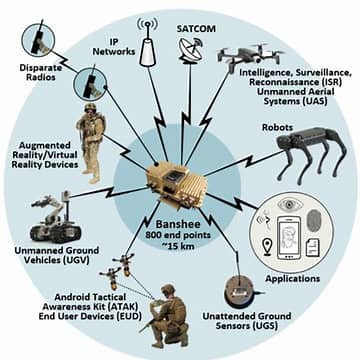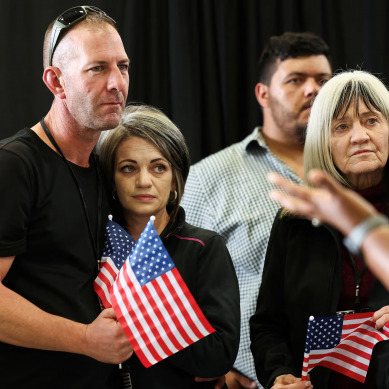
Kenya has reaffirmed its commitment to promoting the responsible use of Artificial Intelligence (AI) in the defence and security sectors, stressing that the fast-evolving technology must be harnessed to advance peace, stability and the protection of human dignity.
The conference took place against the backdrop of the East African nation positioning itself as a regional leader in digital transformation, with its AI Strategy 2030 complementing wider government initiatives to harness technology for economic growth and national security.
With international partners pledging continued support, the Nairobi forum was described as an important step towards building trust, transparency and collective responsibility in managing AI for peace and security.
Kenya is taking the cue from the US Army, which wants to incorporate commercial private-sector AI algorithms into its operations in order to improve efficiency and productivity, but it’s clearly worried about the ongoing security risks associated with the technology.
Speaking at the recent AWS Washington DC summit, Young Bang, principal deputy assistant secretary of the Army for acquisition, logistics and technology, emphasised the efficiency of adopting existing AI tools over creating new ones from scratch, according to Techno Radar, a technology industry publication.
In Nairobi, Defence Cabinet Secretary Soipan Tuya warned that Africa must play a proactive role in shaping global frameworks on military AI, noting that the workshop hosted in Nairobi, was a milestone for the continent.
“Kenya is particularly proud to co-host this consultation for the second year in a row, having already launched the AI Strategy 2030, which lays the foundation for a comprehensive national AI policy,” Tuya pointed out during the African Regional Consultation on Responsible AI in the Military Domain (REAIM).
The ministry said the strategy provides a roadmap for integrating AI into national development, while safeguarding against misuse in sensitive areas such as defence.
Techradar says, “The US Army is reportedly most excited about the technology’s potential to process its extensive data reserves, where it can handle huge amounts of data in seconds. Among the six branches of the US armed forces, the Army is the most prolific users of AI and algorithms, driven by its data-rich environment. This data dependency underscores its desire to speed up processing and handling with a handy injection of AI. However, despite AI’s clear benefits, the transition isn’t without its challenges. Security concerns, including biases, hallucinations and the potential for compromised data, need careful consideration.”
Consequentially, it adds, the Army plans to issue a request for information to the private sector for solutions, rather than tackling the risks internally.
The minister noted that Kenya’s participation in the development of the United Nations resolution on responsible military AI underscored the country’s dedication to multilateral cooperation.
Further, she mentioned that the collaboration between Africa and international partners demonstrates the importance of shared responsibility in ensuring emerging technologies strengthen peace and security.
On July 4, 2025, the International Committee of the Red Cross (ICRC) and the Institute of International Relations at Tsinghua University (TUIIR) co-hosted a panel on Challenges and Opportunities of the Use of AI in Armed Conflict as part of the 13th World Peace Forum in Beijing.
The experts and scholars from China, Europe and the United States, as well as representatives from humanitarian organisations and government institutions, engaged in in-depth discussions on the transformative impacts of AI on modern warfare and international security, its ethical and humanitarian implications, and the urgent need for effective global legal regulations.
“Emerging technologies are reshaping the conduct of hostilities, making it increasingly complex. In today’s rapidly evolving security landscape, the integration of AI in military operations has raised, legal ethical and humanitarian concerns. AI’s integration in warfare is redefining combat, introducing advantages and profound complexities at the same time,” observed the panel that is chaired by Baltharsar Staehelin, Personal Envoy of the ICRC President to China and Head of the Regional Delegation for East Asia.
AI is influencing and accelerating military decisions in warfare – often in ways that exceed human cognitive capacity – thereby increasing risks to civilians. The ICRC holds that when states employ AI in life-and-death decision-making, meaningful human control and judgment must be preserved. Legal obligations and moral responsibilities in war must never be outsourced to machines or software, according to the panel.
National Defence University-Kenya Deputy Vice Chancellor, Centre for Security and Strategic Studies, Maj-Gen Joyce Sitienei, stated that Africa must be an ‘active architect’ in developing ethical frameworks for military AI.
Maj-Gen Sitienei applauded the Netherlands, the Republic of Korea and Spain for their continued collaboration as co-hosts of the consultations and congratulated Spain for assuming the role of hosting this year’s global REAIM Summit.
Sitienei also recognized the technical support provided by the United Nations Institute for Disarmament Research (UNIDIR) and commended Kenya Defence Forces officers for their role in organizing the forum.
Additionally, she called for greater involvement of civil society, academia and youth in AI governance, warning that Africa cannot afford to side-line its innovators in such a transformative field.
“We must bring different stakeholders on board, with young people at the centre of this discussion, because they are innovative and at the heart of the AI revolution,” urged Sitienei.
Making his remarks, South Korea ambassador to Kenya, Kang Hyung-shik, observed that the consultation was a platform for strengthening international cooperation in tackling emerging global challenges.
He congratulated participants on the opening of the UN General Consultations and praised Kenya’s leadership in convening the forum.
“AI is advancing at an unprecedented pace, bringing both opportunities and challenges that demand collective responsibility and principled approaches,” he noted.
Hyung-shik underlined the need for multi-stakeholder dialogue and pledged South Korea’s commitment to deepening bilateral ties with Kenya, particularly in defence cooperation. He revealed that Kenya and South Korea have enjoyed a flourishing relationship since establishing diplomatic ties in 1964. The ties are anchored on shared democratic values and cooperation in multilateral platforms.
Dutch ambassador to Kenya Henk Jan Bakker addressed the importance of dialogue and accountability in AI governance. Bakker described AI as a transformative tool in defence, supporting decision-making, logistics, and situational awareness, but warned that it also carries serious risks such as loss of human control over weapons systems, spread of disinformation and erosion of trust.
“Innovation must be matched with accountability to ensure AI contributes positively to global peace and security,” advised Bakker.
He recalled that the Netherlands co-launched the first REAIM Summit in 2023 with Korea and the second in Seoul in 2024, stressing that challenges posed by AI are global and require inclusive co-operation.
Also speaking at the event was Deputy Head of Mission at the Embassy of Spain in Nairobi, Miguel Solar Gomis, who reaffirmed his country’s commitment to advancing responsible use of AI in the military domain.
He thanked Kenya, The Netherlands and Korea for their collaboration and commended UNDP for its technical support.
Gomis also announced that Spain will host the third REAIM Summit on Responsible AI in the Military Domain later this year. The conference will be organised by the ministries of foreign affairs, defence and information, communications and the digital economy.
The event, according to Spain’s deputy head of mission, will provide a platform for governments, academia, think tanks, and civil society to exchange views and translate principles into concrete actions.
“Spain is committed to a human-centred approach in AI, ensuring human responsibility and control, especially in critical decisions such as the use of force,” Gomis explained.
He highlighted that the summit will focus on governance, technological aspects, and military applications of AI, with the aim of turning agreed principles into practice. Notably, the Nairobi consultation underscored the need for AI development in defence to remain aligned with international law and ethical values.
Participants urged African nations to build capacity, strengthen regional cooperation and engage diverse voices to ensure the continent plays a central role in shaping the rules governing military AI.
- A Tell Media KNA report / By Wendy Sheilla and Naif Rashid
Defence Cabinet Secretary Soipan Tuya delivers her remarks during the Africa Regional Consultation workshop on Responsible AI in the Military Domain (REAIM) held at a Nairobi hotel on August 27, 2025.







